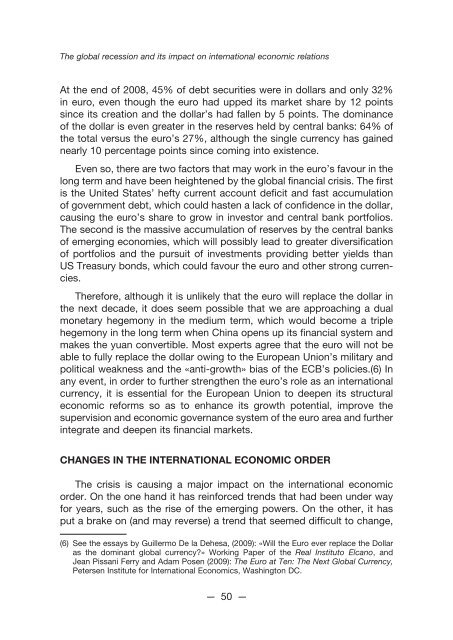Strategic Panorama 2009 - 2010 - IEEE
Strategic Panorama 2009 - 2010 - IEEE
Strategic Panorama 2009 - 2010 - IEEE
Create successful ePaper yourself
Turn your PDF publications into a flip-book with our unique Google optimized e-Paper software.
The global recession and its impact on international economic relations<br />
At the end of 2008, 45% of debt securities were in dollars and only 32%<br />
in euro, even though the euro had upped its market share by 12 points<br />
since its creation and the dollar’s had fallen by 5 points. The dominance<br />
of the dollar is even greater in the reserves held by central banks: 64% of<br />
the total versus the euro’s 27%, although the single currency has gained<br />
nearly 10 percentage points since coming into existence.<br />
Even so, there are two factors that may work in the euro’s favour in the<br />
long term and have been heightened by the global financial crisis. The first<br />
is the United States’ hefty current account deficit and fast accumulation<br />
of government debt, which could hasten a lack of confidence in the dollar,<br />
causing the euro’s share to grow in investor and central bank portfolios.<br />
The second is the massive accumulation of reserves by the central banks<br />
of emerging economies, which will possibly lead to greater diversification<br />
of portfolios and the pursuit of investments providing better yields than<br />
US Treasury bonds, which could favour the euro and other strong currencies.<br />
Therefore, although it is unlikely that the euro will replace the dollar in<br />
the next decade, it does seem possible that we are approaching a dual<br />
monetary hegemony in the medium term, which would become a triple<br />
hegemony in the long term when China opens up its financial system and<br />
makes the yuan convertible. Most experts agree that the euro will not be<br />
able to fully replace the dollar owing to the European Union’s military and<br />
political weakness and the «anti-growth» bias of the ECB’s policies.(6) In<br />
any event, in order to further strengthen the euro’s role as an international<br />
currency, it is essential for the European Union to deepen its structural<br />
economic reforms so as to enhance its growth potential, improve the<br />
supervision and economic governance system of the euro area and further<br />
integrate and deepen its financial markets.<br />
CHANGES IN THE INTERNATIONAL ECONOMIC ORDER<br />
The crisis is causing a major impact on the international economic<br />
order. On the one hand it has reinforced trends that had been under way<br />
for years, such as the rise of the emerging powers. On the other, it has<br />
put a brake on (and may reverse) a trend that seemed difficult to change,<br />
(6) See the essays by Guillermo De la Dehesa, (<strong>2009</strong>): «Will the Euro ever replace the Dollar<br />
as the dominant global currency?» Working Paper of the Real Instituto Elcano, and<br />
Jean Pissani Ferry and Adam Posen (<strong>2009</strong>): The Euro at Ten: The Next Global Currency,<br />
Petersen Institute for International Economics, Washington DC.<br />
— 50 —

















